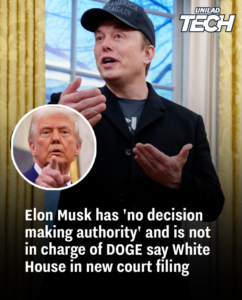In a recent legal filing, the White House clarified that Elon Musk, while serving as a senior adviser to President Donald Trump, holds no formal decision-making authority within the Department of Government Efficiency (DOGE). This statement comes amid legal challenges questioning Musk’s influence over the department.
Joshua Fisher, director of the Office of Administration at the White House, stated in the filing that Musk is not an employee of DOGE and lacks any official capacity to make governmental decisions. Fisher emphasized, “Like other senior White House advisors, Mr. Musk has no actual or formal authority to make government decisions himself.”
Despite this clarification, Musk has been prominently involved in overseeing DOGE operations, advising President Trump on initiatives aimed at reducing government bureaucracy and spending. His role has led to significant actions across various federal agencies, including extensive job cuts. The next target for these efficiency measures is reportedly the Pentagon.
The ambiguity surrounding Musk’s role has prompted legal action. A coalition of 14 Democratic state attorneys general has filed a lawsuit challenging Musk’s influence, arguing that his authority should require Senate confirmation. The case is currently under the purview of U.S. District Judge Tanya Chutkan, who is considering an emergency request to restrict Musk’s role.
This situation draws parallels to previous administrations where senior advisers held significant influence without formal titles or Senate confirmation. For instance, Anita Dunn served as a senior adviser to President Joe Biden, wielding considerable sway over policy decisions without an official administrative role.
The legal challenges also highlight concerns about the establishment and operation of DOGE. Critics argue that creating a federal department without Congressional approval and granting significant influence to an unelected adviser undermines democratic processes. The White House’s recent filing aims to address these concerns by delineating the boundaries of Musk’s advisory role.
As the legal proceedings continue, the administration’s approach to government efficiency and the roles of its advisers remain under scrutiny. The outcome of this case could set significant precedents regarding the influence of non-confirmed advisers in federal operations and the processes required for establishing new governmental departments.

